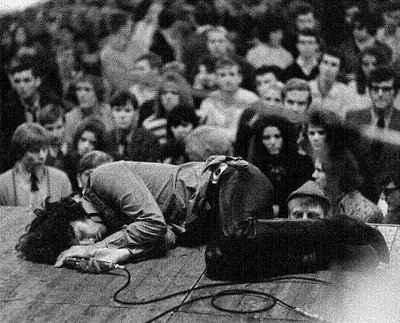My only friend, the end
 Music is best enjoyed with an appreciation of the context that it was created in. So for me, The End is firmly rooted in the 1960's counter-cultural revolution.
Music is best enjoyed with an appreciation of the context that it was created in. So for me, The End is firmly rooted in the 1960's counter-cultural revolution.
Of all the bands from this time, the Doors' music has more longevity than most, still revered by some for the swirling music and powerfully dark lyrics. The Doors embodied the contradictions of the 1960s – promise and possibility, but also chaos and disorder.
The band's name – from a novel by Aldous Huxley – was in turn inspired by a line in William Blake's poem, the Marriage of Heaven and Hell. "If the doors of perception were cleansed everything would appear to man as it is."
As we explain in an earlier post, an audit checks that things appear as they are. In a sense, we're helping people move through the door of perception. But for an audit office, where is the end? Is the end of an audit found at the print button or do we need to move beyond our own door of perception and open ourselves up to a more proactive approach?
Collective lessons and observations
Following on from an earlier post, the ACAG conference heard from the 2012 VAGO Reflections report, which identified six persistent and recurring shortcomings in Victoria's public services. Collective analysis like this is useful in providing all agencies with an indication of the more generic risks they should be thinking about. It’s an example of another way to make the ripples spread further.
We've recently reported the collective observations from our 2012/13 work programme, which was themed around the question, Our future needs, is the public sector ready?
Using new technology
Another way is to harness new technology. The Wales Audit Office has created its good practice exchange, @GoodPracticeWAO. Its guiding principle is to act as a conduit for sharing knowledge and not reinventing the wheel. The good-practice exchange works in collaboration with other organisations and uses case studies, shared learning seminars, and online good practice guidance.
Being understood
However we spread our message, it needs to be easily understood by the people who're in a position to effect change. This means findings that are easy to read, accessible, and relevant to people.
INTOSAI has produced useful guidance for audit offices suggesting ways to increase audit impact. I've selected two that appealed to me.
Target audiences – Like audit offices elsewhere, the OAG provides professional, impartial, and independent support to the work of Parliament. But who else is or should be interested in what we do? Other public agencies, the media, and the general public. Beyond that, we have the ill-defined body of people known as opinion formers – academics, commentators, opinion leaders, and special interest groups.
INTOSAI recommends identifying all target audiences early in the audit process and engaging with them as the audit progresses. You then have a ready-made wider audience for your work and one that will raise its profile and indirectly promote it. Audit offices need to be long-sighted enough to recognise that the returns on investment in this kind of engagement may not appear until after the work is completed.
Be proactive and help the media understand – Parliamentarians, agencies, and the general public follow the media closely. So why not get the media to help transmit the audit message?
More than ever before, journalists are under pressure to produce more copy in less time. Nick Davis's book, Flat Earth News, provides a revealing insight into the modern journalist's trade.
Audit offices need to recognise that time to read audit reports is in short supply. So what can we do to help journalists understand our main messages accurately? One of INTOSAI's suggestions is the idea of a "media lock-up". This is a closed meeting where journalists have enough time to digest the report before their deadlines and ask the audit team questions.
However you increase impact, an audit is part of a wider process for providing assurance and achieving beneficial change. Audit reports are not an end in themselves, but rather a key part of the process of making government transparent and accountable.
In my view, the hard work starts beyond the door – that's what keeps me coming to work in the morning (apart from the rock 'n' roll lifestyle of an auditor, that is).
